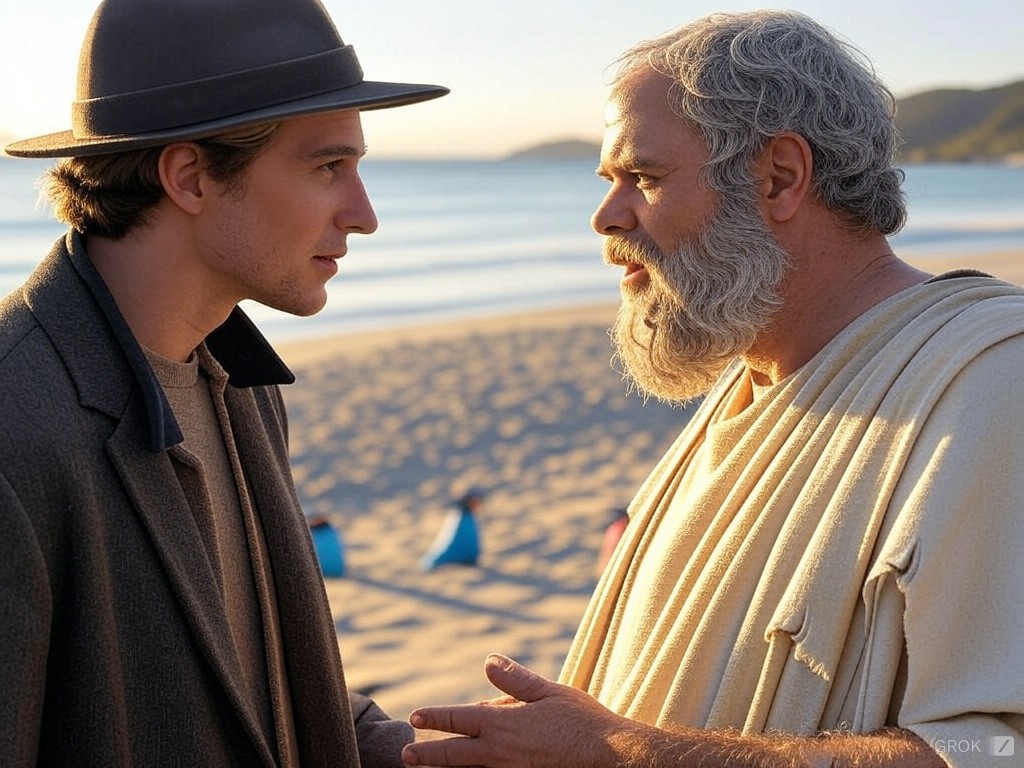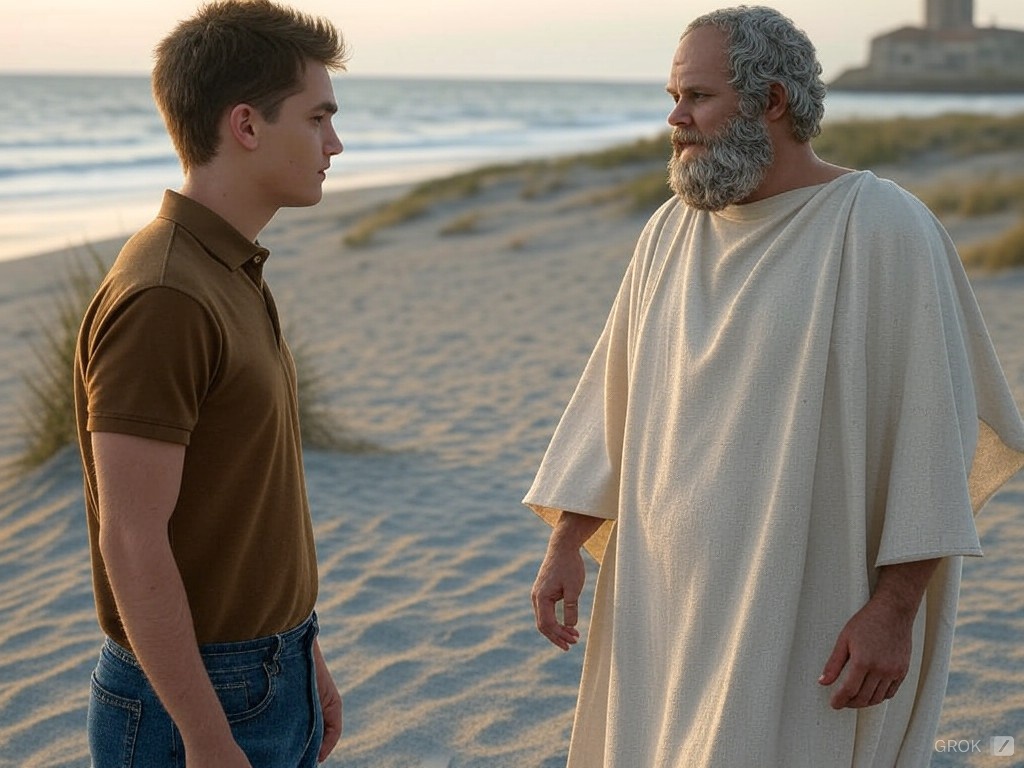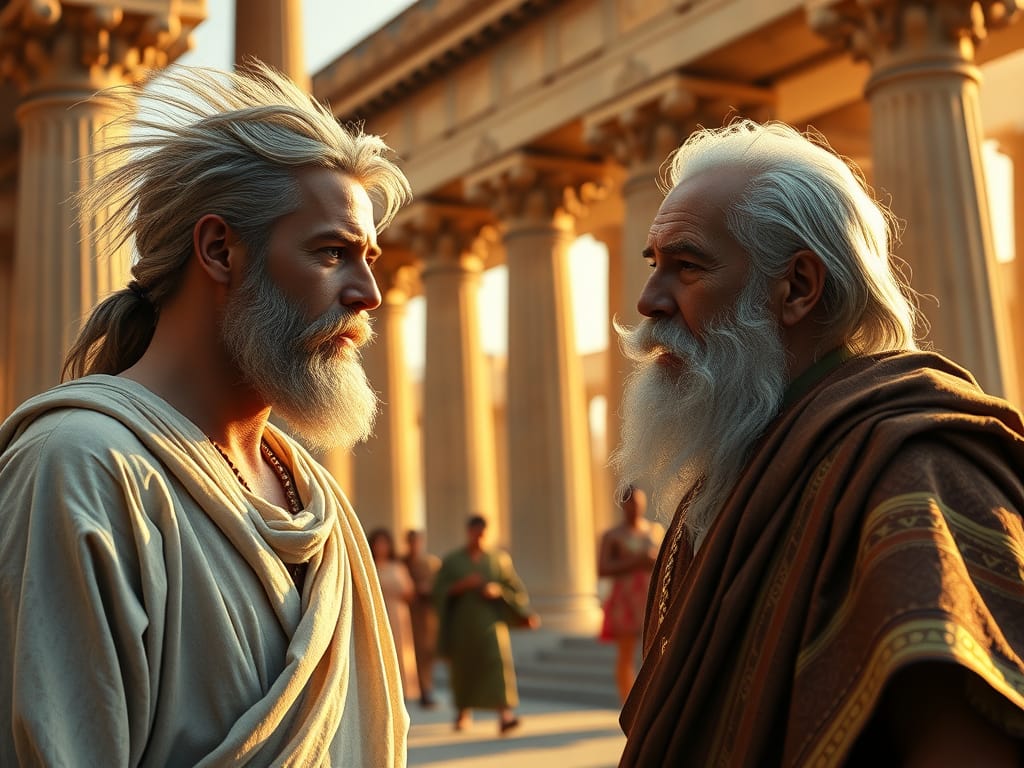
Recently I asked the readers and viewers of VJM Publishing material to ask me any question they liked, in the fields of psychology, politics or spirituality, and I would answer it. The question answered in this essay – and I apologise for not being able to remember who asked it! – is who my guru is.
There’s a very simple answer to that question: Socrates.
There were few positive male role models in my childhood environment. I was the son of a gang member, and various uncles were also gang members, drug dealers or junkies. I was fortunate enough to have an excellent grandfather, who taught me a basic sense of honour and decency, but my philosophical ambitions soon brought me beyond what my family could fulfill. I needed a guru.
My male teachers at school were generally decent men, typical of the high-trust society that was 20th Century Nelson. But they weren’t gurus. The pains of life etched in their faces were understandable even to a child. Clearly, they were struggling through life much like I was, and needed a guru much like I did.

In Classics class during my final year of high school, one assigned topic was the trial and execution of Socrates. We learned how Socrates brought wisdom to the ungrateful masses of Athens, who eventually voted to have him killed. His form of execution was to drink a deadly hemlock tea. As I first learned the story, I presumed that he would refuse to do this, but he did, reasoning that it was not only his duty but he wasn’t afraid of death anyway.
I was awestruck.
Soon I developed a total fascination with this feat. This equanimity in the face of death seemed superhuman to me. Everything I had believed – or been taught – about human nature suggested that death was the most terrifying thing possible, the darkest of all mysteries, the termination of all of one’s dreams.
Everyone around me behaved as if scared stupid of the subject, never speaking about it. Socrates’s example proved that man need not fear death, and not in the delusional, heroin-high manner of the Christians and other religious fanatics. It was possible to die without fearing death simply through philosophy.
About a decade after I finished high school, I had lived a full life. I had earned a couple of degrees, been around the world a few times, even been married and divorced. The problem of death still plagued me though. Haunted me. What was the point of any of this, if I was doomed to die and all of it would be forgotten?

Here Socrates still acted as the guru. It was through studying him, and his disciple in Plato, that I came to realise the role of the Eleusinian Mysteries in the philosophy of fearlessness in the face of death. These Mysteries were famous in ancient Greece for alleviating the participants’ fear of death; Plato and Cicero wrote about their effects, and Aristotle, Epictetus, Plutarch, Alcibiades, Euripides, Sophocles, Pindar, Augustus, Hadrian, Marcus Aurelius and Julian were known to have been initiated.
Through learning about these mysteries, I came upon psilocybin mushrooms – believed by Terence McKenna to be the main psychoactive ingredient of the kykeon drunk by all participants in the Eleusinian Mysteries. This led me to taking psilocybin mushrooms myself and undergoing a total spiritual transformation at age 27, something discussed at length on this website.
Later, when I came to think more about politics, Socrates was still the guru, being the hero of Republic and Plato’s explication of political reality. Socrates’s unsurpassed example of honest reason as a tool to uncover the truth of political questions, despite opposition from liars and fools, inspired me. Like Socrates, but to a lesser extent, I have also been banned, cancelled and suppressed. I am proud to have followed in Socrates’s example!
Even now, I can still gain great insight about the nature of the soul from reading Phaedo. Socrates’s description of philosophy as preparation for death sets my entire life into a perspective that makes sense and gives it meaning. I might be almost 30 years older now than when I first read about Socrates, but his example of assuaging fear of death through pure reason appeals to me just as much today.
Many people think I am crazy for turning my energies away from making money and turning them towards spirituality instead. They don’t understand why a person would meditate or do psychedelics at all, let alone do little else for over a decade. Why philosophise at all, when there is money to be made?
I do it because of the example of relentless pursuit of truth set by Socrates, who is to me the most admirable man of all. This has led me to the spiritual beliefs expressed in Elementalism and in the essays on this website.
*
For more of VJM’s ideas, see his work on other platforms!
For even more of VJM’s ideas, buy one of his books!
*
If you enjoyed reading this piece, buy a compilation of our best pieces from previous years!
Best VJMP Essays and Articles of 2023
Best VJMP Essays and Articles of 2022
Best VJMP Essays and Articles of 2021
Best VJMP Essays and Articles of 2020
Best VJMP Essays and Articles of 2019
Best VJMP Essays and Articles of 2018
Best VJMP Essays and Articles of 2017
*
If you would like to support our work in other ways, make a donation to our Paypal! Even better, buy any one of our books!
